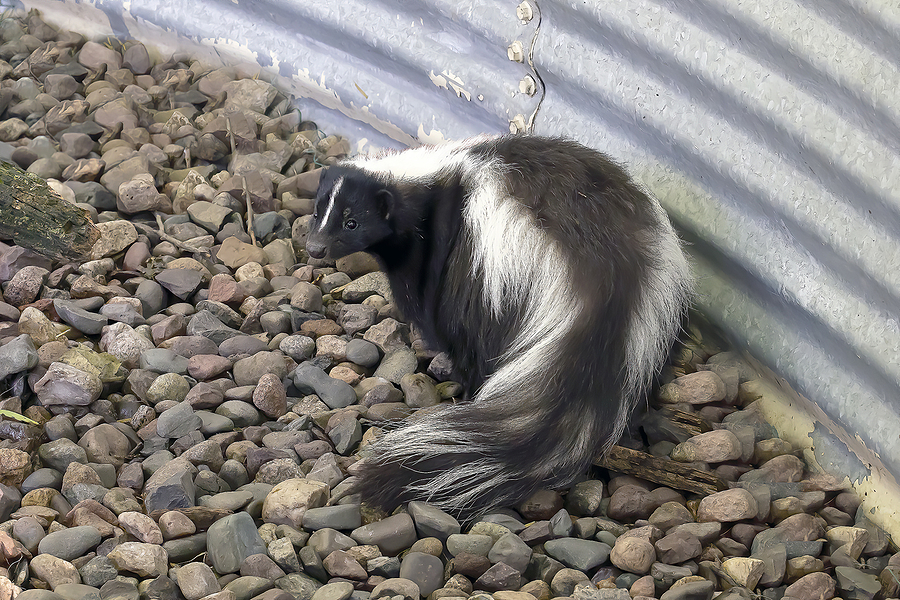Skunks can be an adorable sight, but when they invade your property, they become unwelcome guests. These nocturnal creatures can cause significant damage, from disturbing your garden to spreading a pungent odor. This post will help homeowners, garden enthusiasts, and pest control seekers understand skunk behavior, risks, and measures for effective skunk prevention and control.

Identifying Nuisance Skunk Behavior
Knowing the signs of skunks on your property is the first step toward effective control. Look for burrows, overturned garbage cans, or the unmistakable odor they leave behind. Identifying these indicators early can help you take timely action to prevent potential damage and keep your environment safe.
Most Common Signs of Skunks
- Strong Odor: A distinctive, foul smell is a clear indicator of skunks nearby.
- Ground Digging: Look for small, shallow holes in your yard, which are evidence of skunks searching for insects.
- Tracks and Droppings: Skunk tracks show five toes with visible claws, and their droppings resemble cat feces.
Typical Skunk Behavior
- Nocturnal Habits: Skunks are primarily active at night, making it challenging to spot them during the day.
- Habitat Preferences: They prefer dark, secluded areas such as under porches, decks, and sheds.
- Diet: Skunks are omnivores, consuming both plant and animal matter, including insects, small rodents, fruits, and vegetables.
Risks Associated with Skunk Infestation
Skunks pose several risks that homeowners should be aware of. These animals can carry diseases such as rabies, and their spray can cause significant discomfort and lingering odors. Additionally, their burrowing habits can damage lawns and foundations. It’s important to take precautions to prevent skunks from inhabiting your property.
Health and Safety
- Rabies: Skunks are known carriers of rabies, which can be transmitted to humans and pets.
- Parasites: Fleas, ticks, and mites are common parasites that skunks can bring onto your property.
Structural Damage
- Structural Damage: Skunks can burrow under structures, causing damage to foundations and patios.
- Garden Destruction: They dig up lawns and gardens in search of food, ruining your landscaping efforts.
Threat to Pets
- Skunk Spray: The infamous skunk spray can cause temporary blindness and severe discomfort for pets.
- Aggressive Behavior: Skunks may act defensively if they feel threatened, posing a risk to curious pets.
DIY Prevention and Control Measures
Preventing and controlling skunks requires a proactive approach. This involves securing trash cans, eliminating food sources, and sealing entry points to prevent skunks from burrowing under structures. Regular maintenance and being vigilant about potential attractants can significantly reduce the chances of a skunk problem.
Effective and Humane Methods
- Secure Trash Cans: Use lids that lock to prevent skunks from accessing food waste.
- Remove Attractants: Keep pet food indoors and clean up fallen fruits and vegetables from your garden.
- Seal Entry Points: Block access to potential den sites under porches, decks, and sheds with mesh or other materials.
Tips for Homeowners
- Install motion-activated lights or sprinklers to deter skunks from entering your yard.
- Use natural repellents like citrus peels or ammonia-soaked rags to discourage skunks.
Professional Skunk Removal and Control
Sometimes, professional animal removal service is necessary to effectively manage skunk infestations. These experts can safely remove the animals, identify entry points, and implement measures to prevent future invasions. Their knowledge and experience ensure that the problem is handled efficiently and humanely.
General Wildlife Control Services
- Inspection and Assessment: Professionals conduct thorough inspections to identify skunk habitats and entry points.
- Humane Trapping: Licensed experts use humane traps to capture and relocate skunks.
- Exclusion Techniques: Services include sealing entry points and installing barriers to prevent future infestations.
What to Expect from a Licensed Skunk Removal Service
- Safety Measures: Professionals ensure both human and animal safety throughout the process.
- Expertise: Trained wildlife control experts have the knowledge and experience to handle skunk infestations effectively.
- Equipment and Resources: Professionals use specialized equipment and techniques to safely and humanely remove skunks from your property.
Legal and Ethical Considerations
Managing wildlife involves adhering to specific laws and ethical standards to ensure the preservation of ecosystems and the protection of various species. This includes regulating hunting practices, habitat conservation, and implementing measures to prevent illegal poaching.
Indiana Laws and Regulations
- Permits: Certain permits may be required for trapping and relocating skunks.
- Protected Species: Ensure you’re aware of any regulations protecting local wildlife.
Ethical Considerations
- Humane Treatment: Always prioritize humane methods when dealing with skunks.
- Ecosystem Impact: Consider the broader impact on the local ecosystem before taking action.
In Summary
Proactive measures are crucial in preventing and controlling skunk infestations on your property. By understanding their behavior, recognizing risks, and implementing both DIY and professional strategies, you can protect your home and garden from these nuisance creatures.
For comprehensive and effective critter control against these pesky porch pirates, let our wildlife management experts help. Contact Budget Animal Removal at 317-875-3099 for DNR licensed and insured skunk removal and control in Indianapolis and its surrounding counties. Request a free estimate or advice, today!
Related Posts:
Smell No More: Your Comprehensive Guide to Skunk Removal
Frequently Asked Questions About Nuisance Skunks
Are Skunks Dangerous?

